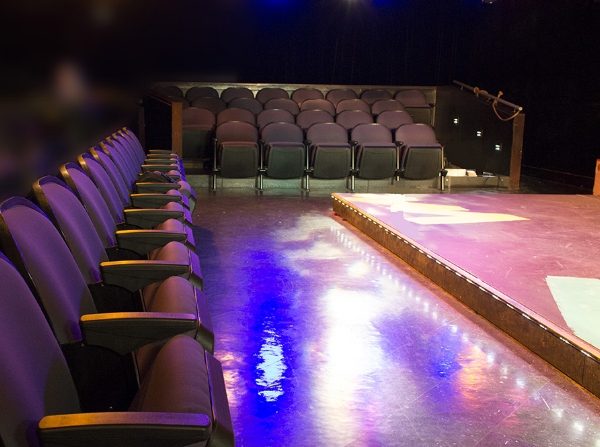The 5 Most Underrated MFA Acting Programs of 2018-19
Unlike other industries, getting a master’s degree isn’t necessarily a requirement for theatre professional to succeed. However, for those looking to teach or further their training, there are many strong MFA programs all over the country.
In the past we’ve done a list of who we felt were the best MFA programs out there. This year, we thought we would changing things up by highlighting programs we felt offer excellent educational opportunities that don’t get enough attention.
Just as how we evaluated undergraduate programs, we looked at the following criteria to come up with our selections:
Quality of Facilities
Cost / Scholarship Opportunities
Quality of Faculty (Terminal degrees, professional experience, and full-time vs adjunct)
Admissions / Auditions / Selectivity
Quality of Curriculum
Career & Alumni Support
Performance Opportunities
So without further ado, in no particular order, here are our picks for the five most underrated MFA Acting programs for this year.
Wayne State University - Detroit, MI
Program Description: “The Hilberry Acting program was conceived with the belief that one of the best systems of theatre training is an intensive, performance-guided experience based on a series of European and American classics, combined with noteworthy contemporary plays performed in rotating repertory. Continual performance before a live audience is considered a fundamental part of the learning process.
Highlighted explorations include the processes of Konstantin Stanislavsky, Michael Chekhov, Jacques Lecoq, and Sanford Meisner. Styles and genres covered include psychological realism, neutral mask, Greek chorus, commedia dell'arte, high comedy, revenge tragedy, Shakespeare and expressionism/surrealism. Movement classes emphasize alignment, agility and strength, as well as period dance/deportment and Pilates. Voice classes employ a somatic approach based in the work of Catherine Fitzmaurice.
The department regularly invites guest artists and teachers who provide additional instruction in movement, dance, acting, voice and Shakespearean text analysis, as well as professional talent agents from a variety of regions who offer additional industry insight and training.”
University of North Carolina - Chapel Hill, NC
Photo: Jon Gardiner
Program Description: “The Professional Actor Training Program (PATP) at the University of North Carolina Chapel Hill is a rigorous three-year Master of Fine Arts program. The purpose of the program is two-fold: to offer advanced training to early-career professionals in acting, voice and speech, movement, and professional rehearsal and performance practice; and to provide a bridge by which our graduates, with credibility and a significant circle of professional acquaintance, may enter the profession.
The Program’s affiliation with PlayMakers Repertory Company, an Equity/LORT theatre, provides an ongoing opportunity for training and significant work within a nationally-recognized professional company. In addition to other criteria, actors auditioning for the Professional Actor Training Program are selected for their ability to function as core members of the PlayMakers acting company. Each PATP student will be eligible to become a member of Actors’ Equity Association prior to or at the time of graduation. Immediately following the conclusion of training, PATP actors are seen by casting professionals and agents in a Showcase presentation in New York City.
Classes are taught by resident master teachers and distinguished guest faculty within a conservatory structure. The training is progressive and cumulative and must be completed in three consecutive years.”
University of Georgia - Athens, GA
Program Description: “Building on a performer's core strengths, the program cultivates the artist's individual voice with intensive studies in acting, voice, and movement. Training encompasses Stanislavski, Meisner, Michael Chekhov, Alexander, Linklater, LeCoq, and Laban. In addition, assistantships are available in teaching, public relations, community outreach, and other leadership opportunities. Our graduates go on to become practitioners in film, television, theatre, digital media, and education.”
Kent State University - Kent, OH
Program Description: “The foundation of the training is firmly rooted in the techniques of physical action developed by Constantin Stanislavski. The foundation is built upon by other major influences and approaches throughout the training period and provides the strongest combination of graduate level training.
Actors study voice and speech through a sequence of classes grounded in established vocal approaches. These studies are designed to expand and strengthen the voice, provide a variety of options in speech, dialects and accents, and ensure the actor’s vocal health. Movement work incorporates Laban Movement analysis, Alexander Technique, masks, and dance. Through the movement studies the students are empowered to explore their own physical vocabulary while gaining the skills to create roles in various styles.
The MFA candidate has numerous opportunities to connect with working professionals beyond the academic environment. Through the Roe Green Visiting Director Series connections with guest directors from important venues are forged. Internships opportunities may exist with Porthouse Theatre, Northeast Ohio's premiere professional summer theatre. Candidates may work alongside of seasoned professionals and can possibly earn points toward their membership in Actor’s Equity Association.”
Louisiana State University - Baton Rouge, LA
Program Description: “The On Camera training, career mentorship and proximity to the Louisiana Film Industry, a top state for film production in the nation, allows for a seamless transition into that market upon graduation without the need for a SAG card. Multiple workshop and production opportunities with a wide range of significant professional artists and scholars from theatre, film/TV, musical theatre, and multi-media performance.
All classes are held in the newly renovated Music and Dramatic Arts (M&DA) building in state of the art rehearsal and teaching spaces. The M&DA complex also houses the beautiful art-deco proscenium Shaver Theatre and a flexible black box Studio Theatre. Those spaces along with the Reilly Theatre, a larger flexible space most often used as a thrust, are all used in our Swine Palace season and offer an opportunity to play in a variety of theatre configurations. The MFA class constitutes the core of the professional company, works with accomplished guest artists, and for those not already Equity members, earns membership points in Actors’ Equity Association (AEA).”




